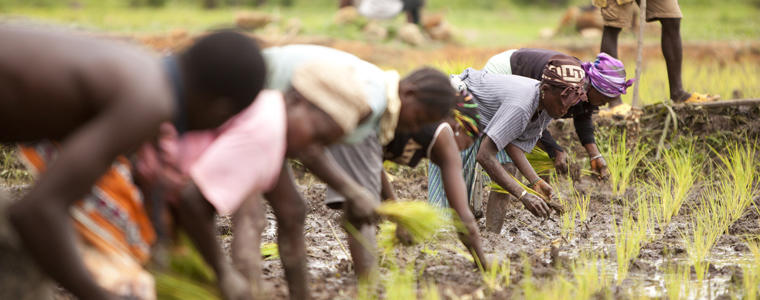Liberian Minister of Foreign Affairs Augustine Ngafuan and U.S. Undersecretary of State Wendy Sherman led inaugural talks at USIP that sought cooperation to further reduce hunger and develop the agriculture and power sectors in the African nation.

In the 10 years since the end of Liberia’s devastating civil war, the country has held two consecutive presidential and general elections, upgraded social services and infrastructure, embraced civic freedoms, negotiated the cancellation of $4.9 billion of foreign debt, and begun to improve governance.
Still, the challenges of the future remain “colossal and daunting,” Minister of Foreign Affairs Augustine Ngafuan told an audience at the U.S. Institute of Peace this week, at the inaugural talks of the U.S.-Liberia Partnership Dialogue.
“The distance we have traveled thus far in addressing the … challenges we have inherited as a government pales in magnitude when compared to the distance we still have to travel,” Ngafuan said.
Progress that has vaulted Liberia into the ranks of the 10 fastest-growing economies in sub-Saharan Africa hasn’t addressed severe unemployment, and 33 percent of the population is still considered to be undernourished, according to the Global Hunger Index compiled by the International Food Policy Research Institute (IFPRI). The group rated Liberia’s state of hunger as “serious.”
“While the country is blessed with a climate favorable to agriculture, extensive biodiversity, and vast natural resources, decades of war and low economic and social investments have ravaged Liberia’s productive assets,” according to IFPRI.
Ngafuan and other ministers of Liberia’s Cabinet joined U.S. government counterparts this week at USIP for talks on the first two of three areas that the African nation plans to focus on to further its development -- agriculture and food security, along with energy and power infrastructure. A follow-up session in the Liberian capital Monrovia before the end of this year will tackle the subject of human development issues.
The U.S.-Liberia Partnership Dialogue was announced in January by then-Secretary of State Hillary Clinton and Liberian President Ellen Johnson Sirleaf with the aim of providing sustained American technical and financial assistance at the highest diplomatic levels as the country continues to mend the destruction wrought by 14 years of civil war.
Johnson Sirleaf, who appeared at USIP in June 2011 and March 2006, has set a longer-term goal of joining the ranks of middle-income countries by 2030.
During the talks at USIP, the agriculture and food security working group discussed policy and institutional constraints to private-sector development in agriculture, said Wendy Sherman, the U.S. undersecretary of state for political affairs. They examined possibilities for more bilateral cooperation to increase the availability of food and improve nutrition, especially through the administration’s Feed the Future initiative.
The energy working group considered how to encourage more private investment in that sector by improving regulatory policies and accelerating development of a “well-governed and inclusive Liberian energy sector,” Sherman said.
“One of the critical impediments to growth in Liberia is our huge power deficit,” Ngafuan said.
Discoveries of oil or gas also could provide a badly needed economic boost. Chevron and Exxon Mobil already are exploring for hydrocarbons in Liberia.
With an annual government budget of just $500 million, the private sector will have to drive development, Minister of Finance Amara Konneh said, appealing to Liberian diaspora in the audience to help promote their homeland to international business.
“We have a population that has been patient, they have been resilient,” he said. “They want to see their children go to better schools, access to health care, etc. But the things that we need to make that happen – they are not there.”
About 65 percent of Liberia’s population is under the age of 25. “How do you get the dividend of peace for these young people,” Konneh asked rhetorically. “This is something we take very seriously.”
Liberian Minister of Lands, Mines and Energy Patrick Sendolo joked that most of the improvements called for end up landing at his doorstep because of the country’s desperate needs for power generation, transmission and distribution.
“The agriculture minister wants to bring in companies that want to invest on a large scale,” and they have a hard time persuading potential investors because of the country’s lagging infrastructure, Sendolo said.
“I’m the provider of power – that’s my fault,” he said to laughs from the audience. “The Minister of Finance wants to grow the economy, [but] no power – that’s my problem. So I’m the bad guy. I take full responsibility for that.”
Ngafuan said he hopes for “deeper and closer links” at technical levels between U.S. and Liberian institutions to craft practical steps toward the established goals.